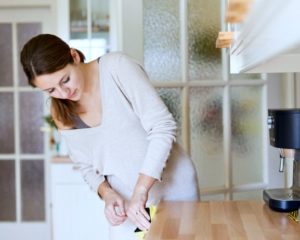 Dear Mardie,
Dear Mardie,
I have been procrastinating. I am scared of the home study social worker coming to do a home inspection. I’m not the best housekeeper and the thought of giving someone a tour of our home is terrifying. What if it isn’t clean enough? What if she opens the closet and it isn’t totally organized? The ‘what if’s’ leave me frozen. I haven’t made much progress out of fear. Do people ever get turned down for a house that is not in perfect condition?
Oh how well I remember the days of preparing for what I was sure was the social workers “white glove test” of our home, to declare it perfect. She didn’t declare it perfect, and I never saw her put on a white glove. That’s the good news for you.
It doesn’t have to be perfect, but it needs to be tidy and safe. Let’s break down what that means so you have reasonable and realistic expectations:
The Tidy Home
You should feel confident showing someone around your home. It should be clean, but not unreasonably so that it looks like no one lives there. If you have clutter around and don’t want to take or make the time to go through it, box it up neatly and store in in the garage. Dust well and vacuum.
It is unlikely that your social worker will open your closets, but make them safe to open, meaning don’t jam them full so that if the door opens she will be buried like you see in cartoons. Take one room at a time, clean and straighten up, then move to the next. Save children’s rooms and bathrooms for last.
If you need help, get your spouse, kids, friends, or relatives lined up. Hire help if you need to. But don’t overstress about this. Think of it as a spring cleaning and get to work. You aren’t getting any younger and any day spent worrying rather than working is one day further away from your child.
The Safe Home
If you have unfinished remodel projects or other things that need attention that may pose a safety hazard, address them now. Consider a broken porch railing, an outlet that gets hot when used, windows without locks, and other items that may pose a potential threat to a toddler. These are the things that you need to have repaired right away.
Your social worker will give you tips on child-proofing and may inform you of certain requirements, such as fencing a pool or your yard if you live adjacent to a body of water. Your house does not have to be baby-proofed today.
She will ask to see where the baby will be sleeping and will look around in that room for safety issues with a little more focus. Items like cords on mini-blinds and windows without safety latches may be mentioned.
She will also ask about your pets and the safeguards you will put in place to keep your child safe. It’s okay if you don’t know the answer to every question about what you will do in the future – she will help advise you on options.
I would like to encourage you to stay focused and set a daily goal, perhaps one room a day. And ask for help. Sometimes we need others to help us get through overwhelming tasks that have us paralyzed. Stay focused on the goal!
